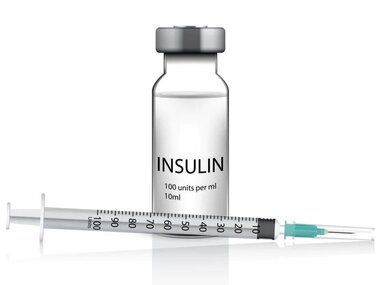Diabetes Management
Why Are Some Diabetes Patients Treated with Insulin Injections?
3 min read
By Apollo 24|7, Published on - 05 February 2024, Updated on - 22 February 2024
Share this article
0
0 like

Diabetes is a complex metabolic condition affecting the body's ability to regulate blood sugar or glucose effectively. There are two main types of diabetes: type 1 and type 2. While both types of diabetes are related to insulin, the hormone responsible for regulating blood glucose levels, the methods of treatment can vary significantly. Type 1 diabetes is an autoimmune disease in which the immune system mistakenly attacks and destroys insulin-producing beta cells in the pancreas. This results in an absolute insulin deficiency and individuals with type 1 diabetes must take insulin injections to manage their blood glucose effectively.
Here's why insulin injections are necessary for people with type 1 diabetes:
Absolute Insulin Deficiency:
In type 1 diabetes, the pancreas no longer produces insulin due to the destruction of beta cells. Insulin is vital for the body to utilize glucose from the bloodstream, and without it, blood sugar levels can rise dangerously high.
Lifesaving Treatment:
For individuals with type 1 diabetes, insulin is a lifesaving treatment. Without it, they cannot regulate their blood sugar levels, which can lead to severe complications, including diabetic ketoacidosis, a life-threatening condition.
Regular Monitoring:
People with type 1 diabetes must closely monitor their blood sugar levels and administer insulin accordingly to keep them within a healthy range. Insulin injections allow for precise control over blood sugar levels.
Different Insulin Types:
Various types of insulin are available, and healthcare providers work with patients to determine the most suitable insulin regimen. These types may include rapid-acting, short-acting, intermediate-acting, and long-acting insulin, each with a specific purpose in managing blood sugar.
On the other hand, type 2 diabetes typically involves insulin resistance, where the body's cells do not respond effectively to insulin. In the early stages of type 2 diabetes, lifestyle changes, dietary modifications, and oral medications are often sufficient for blood sugar control. However, as the condition progresses, some individuals with type 2 diabetes may require insulin therapy as well.
Here's why insulin injections may be necessary for some people with type 2 diabetes:
Progressive Nature:
Type 2 diabetes is a progressive disease, and over time, the pancreas may produce less insulin, exacerbating insulin resistance. In such cases, insulin injections become essential to supplement the body's declining insulin production.
Better Blood Sugar Control:
Insulin therapy can better control blood sugar levels for some individuals with type 2 diabetes. This helps prevent complications and maintains overall health.
Personalized Diabetes Management:
Individualized combination therapy is a personalized approach for managing type 2 diabetes, where healthcare providers customize treatment plans based on the unique needs of each individual. This may involve a combination of oral medications and insulin, ensuring that the chosen interventions are tailored to effectively control blood sugar levels when other treatments are no longer sufficient.
Short-Term Insulin Therapy:
Short-term intensive insulin therapy can be beneficial in the early stages of type 2 diabetes, as it has the potential to enhance the underlying physiological aspects of the condition. This approach may serve as a viable strategy to modify the natural progression of diabetes.
Conclusion
Insulin injections are a crucial and often lifesaving treatment for individuals with type 1 diabetes, as their bodies no longer produce insulin. For some people with type 2 diabetes, insulin therapy becomes necessary as the disease progresses, and other treatments are insufficient to maintain blood sugar control. The goal of insulin therapy is to regulate blood sugar levels, prevent complications, and improve the overall quality of life for those living with diabetes.
Diabetes Management
Consult Top Diabetologists
View AllLeave Comment
Recommended for you
.jpg?tr=q-80)
Diabetes Management
What Is The Impact Of Climate Change On Diabetes Care?
Climate change poses unique challenges to individuals managing diabetes, from increased health risks under extreme weather conditions to disruptions in medical supplies access. Simultaneously, diabetes care also contributes to environmental issues. Tackling these challenges requires robust strategies and coordinated efforts. Enrolling in comprehensive support programmes like Apollo Super 6 can be a strong step towards managing diabetes effectively amidst these challenges.

Diabetes Management
Can Diabetic Dementia be Reversed?
Diabetic dementia affects cognitive function but can be managed for improved quality of life. Optimal blood sugar control is crucial. Lifestyle changes like regular exercise, including aerobic and strength training, enhance insulin sensitivity and brain health. A balanced diet with essential nutrients and healthy fats supports insulin regulation, reducing cognitive impairment risk.

Diabetes Management
Diabetes and Alzheimer's: How are They Connected?
Current research shows a significant connection between diabetes and Alzheimer's. The common thread? Blood sugar control. Poorly managed diabetes can increase the risk of cognitive decline and Alzheimer's disease. Understanding this link could provide strategies to manage both conditions effectively.
Subscribe
Sign up for our free Health Library Daily Newsletter
Get doctor-approved health tips, news, and more.
Visual Stories

8 Fruits That are Incredibly Healthy for Diabetes
Tap to continue exploring
Recommended for you
.jpg?tr=q-80)
Diabetes Management
What Is The Impact Of Climate Change On Diabetes Care?
Climate change poses unique challenges to individuals managing diabetes, from increased health risks under extreme weather conditions to disruptions in medical supplies access. Simultaneously, diabetes care also contributes to environmental issues. Tackling these challenges requires robust strategies and coordinated efforts. Enrolling in comprehensive support programmes like Apollo Super 6 can be a strong step towards managing diabetes effectively amidst these challenges.

Diabetes Management
Can Diabetic Dementia be Reversed?
Diabetic dementia affects cognitive function but can be managed for improved quality of life. Optimal blood sugar control is crucial. Lifestyle changes like regular exercise, including aerobic and strength training, enhance insulin sensitivity and brain health. A balanced diet with essential nutrients and healthy fats supports insulin regulation, reducing cognitive impairment risk.

Diabetes Management
Diabetes and Alzheimer's: How are They Connected?
Current research shows a significant connection between diabetes and Alzheimer's. The common thread? Blood sugar control. Poorly managed diabetes can increase the risk of cognitive decline and Alzheimer's disease. Understanding this link could provide strategies to manage both conditions effectively.

